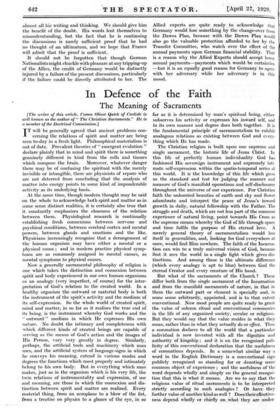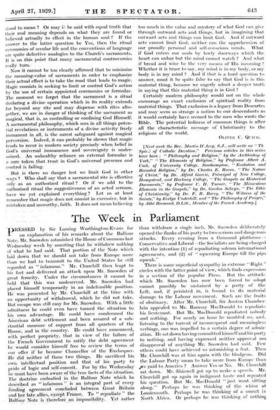In Defence of the Faith
The Meaning of Sacraments
[The writer of this article, Canon Oliver Quick of Carlisle is well known as the author of " The Christian Sacraments." He is a member of the Doctrinal Commission.] TT will be generally agreed that ancient problems con- ceming the relations of spirit and matter are being seen to-day in a fresh light. Philosophical materialism is out of date. Prevalent theories of " emergent evolution " declare plainly that in mind and spirit there is something genuinely different in kind from the cells and tissues which compose the brain. Moreover, whatever danger there may be of confusing the spiritual with the merely invisible or intangible, there are physicists of repute who are not deterred from concluding that the analysis of matter into energy points to some kind of imponderable activity as its underlying basis.
At the same time, though modern thought may be said on the whole to acknowledge both spirit and matter as in some sense distinct realities, it is certainly also true that it constantly emphasizes the closeness of the relation between them. Physiological research is continually establishing fresh connexions between nervous and psychical conditions, between cerebral cortex and mental powers, between glands and emotions and the like. Physicians increasingly recognize that a derangement of the human organism may have either a mental or a physical cause ; and in modern practice physical symp- toms are as commonly assigned to mental causes, as mental symptoms to physical causes.
Now a generally sacramental philosophy of religion is one which takes the distinction and connexion between spirit and body experienced in our own human organisms as an analogy (very imperfect, of course) for the inter- pretation of God's relation to the created world. In a healthy organism the outward or material body is both the instrument of the spirit's activity and the medium of its self-expression. So the whole world of created spirit, mind and matter, in so far as it realizes the true end of its being, is the instrument whereby God works and the " outward " medium in which He expresses His own nature. No doubt the intimacy and completeness with which different kinds of created beings are capable of serving as the means of God's action and the images of His Person, vary very greatly in degree. Similarly, perhaps, the artificial tools and machinery which man uses, and the artificial system of language-signs in which he conveys his meaning, extend in various modes and degrees the functions which most properly and intimately belong to his own body. But in everything which man makes, just as in the organism which is his very life, the twin relations of instrumentality and expression, of use and meaning, are those in which the connexion and dis- tinction between spirit and matter are realized. Every material thing, from an aeroplane to a blow of the fist, from a treatise on physici to a glance of the eye, in so far as it is determined by 'man's spiritual being, either subserves his activity or expresses his inward self, and in its own manner and degree does both together. It is the fundamental principle of sacramentalism to exhibit analogous relations as existing between God and every. thing which He has made.
The Christian religion is built upon one supreme and single sacrament, the historic life of Jesus Christ. In this life of perfectly human individuality God has fashioned His sovereign instrument and supremely inti- mate self-expression within the spatio-temporal series of this world. It is the knowledge of this life which gives us the standard and test for judging the manner and measure of God's manifold operations and self-disclosures throughout the universe of our experience. For Christian faith the unhurried beauties of earth and sky and flower adumbrate and interpret the peace of Jesus's inward growth in daily, natural fellowship with the Father. The struggle and death, which are not less part of the common experience of natural living, point towards His Cross as the supreme means whereby the God of life through space and time fulfils the purpose of His eternal love. A merely general theory of sacramentalism would lose itself in generalities, and, looking for God everywhere at once, would find Him nowhere. The faith of the Incarna- tion can win to a truly universal vision of God, because first it sees the world in a single light which gives dis- tinctions. And among these is the ultimate difference (which every analogy is apt to blur) between God the eternal Creator and every creature of His hand.
But what of the sacraments of the Church ? These differ both from the single sacrament of the Incarnation and from the manifold sacraments of nature, in that in them the outward part or element is specially and, in some sense arbitrarily, appointed, and is to that extent conventional. Now most people are quite ready to grant the value of solemn ritual and conventional ceremonies in the life of any organized society, secular or religious. But they would say that the value resides in what they mean, rather than in what they actually do or effect. Thus a coronation declares to all the world that a particular individual is now invested with all the dignities and authority of kingship ; and it is on the recognized pub- licity of this conventional declaration that the usefulness of coronations depends. In a somewhat similar way a word in the English Dictionary is a conventional sign publicly recognized as standing for or denoting sonic common object of experience ; and the usefulness of the word depends wholly and simply on the general recogni- tion that this is what it means. Are we to say that the religious value of ritual sacraments is to be interpreted strictly according to such analogies ? Or have they further value of another kind as well ? Does their effective- ness depend wholly or chiefly on .what they are under. stood to mean ? Or may it be said with equal truth that their real meaning depends on what they are found or believed actually to effect in the human soul ? If the answer to the latter question be Yes, then the ritual ceremonies of secular life and the conventions of language are quite defective analogies to the Church's sacraments. It is on this point that many sacramental controversies really hum.
Now it cannot be too clearly affirmed that to minimize the meaning-value of sacraments in order to emphasize their actual effect is to take the road that leads to magic. Magic consists in seeking to limit or control God's action by the use of certain appointed ceremonies or formulae. The moment we forget that the sacrament is a ritual declaring a divine operation which in its reality extends ,far beyond any rite and may dispense with rites alto- gether, we are in danger of thinking of the sacrament as magical, that is, as controlling or confining God Himself. A sacramental philosophy, which sees in all things poten- tial revelations or instruments of a divine activity freely immanent in all, is the surest safeguard against magical perversion: Indeed, it can probably be shown that magic tends to recur in modern society precisely when belief in God's universal immanence and sovereignty is under- mined. An unhealthy reliance on external formulae is a sure token. that trust in God's universal presence and control is failing. .
But is there no danger lest we limit God in other ways ? Who shall say that a sacramental rite is effective only as an authorized ritual ? Or if we add to the authorized ritual the suggestiveness of an acted sermon, have we yet explained everything ? Let us at least remember that magic does not consist in excessive, but in mistaken and unworthy, faith. It does not mean believing too much in the value and mystery of what God can give through outward acts and things, but in imagining that outward acts and things can limit God. And if outward acts cannot limit God, neither can the apprehension of our proudly personal and self-conscious minds. What if God enters our souls by lowly doorways which the heart can unbar but the mind cannot watch ? And what if bread and wine be the very means of IBS incoming ? Whether it is truer to say, my mind is in my body, or my body is in my mind ? And if that is a hard question to • answer, must it be quite false to say that God is in this material thing, because we eagerly admit a deeper truth • in Saying that this Material thing is in God ?
Certainly modern philosophy would not on the whole encourage an exact exclusion of spiritual reality from material things. That exclusion is a legacy from Descartes and may seem as strange a notion to our descendants as it would certainly have seemed to the men who wrote the Bible. The potential holiness of common things is after all the characteristic message of Christianity to the religions of the world, OLIVER C. QUICK.
•
[Next week the Rev. Martin D'Arey, S.J., will write on " Th Spit:: of Catholic Devotion." Previous articles in this series have been : " Philosophy and Religion;" by the Archbishop of York," " The Elements of Religion," by Professor Albert A. Cock, of University College, Southampton, " Evolution and Revealed Religion," by Dr. Charles E. Raven, " The Nature of Christ," by. Dr. Alfred Garvie, Principal of New College, Hampstead, and Hackney College, " The Gospels as Historical Documents," by Professor C. H. Turner, " The Miraculous Elements in the Gospels," by Dr. Gordon Selwyn, " The Ethic • of Christianity," by Dr. F. R. Barry, " The Witness of the Saints," by Evelyn Underhill, and " The Philosophy of Prayer," by Abbe Bremond, D.Litt., Member of the French Academy.]









































 Previous page
Previous page